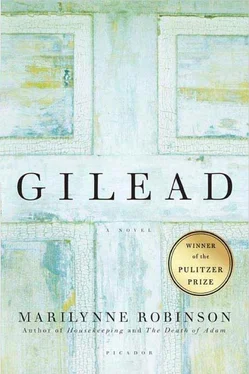I hope there’s some special providence in his turning up just when I have so many other things to deal with, because he is a considerable disruption when peace would have been especially appreciated.
I’m not complaining. Or I ought not to be.
I’ve been thinking about my funeral sermon, which I plan to write to save old Boughton the trouble. I can do a pretty good imitation of his style. He’ll get a laugh out of that.
Young Boughton came by again this morning, with some apples and plums from their trees. He and Glory have things looking pretty nice over there. They’ve done a lot of work. I’m trying to be a little more cordial to him than I have been. He sort of steps back and smiles a little, and looks at me as though he’s thinking, “Today we’re cordial! What can account for that?” And he looks me right in the face, as though he wants me to know he knows it is a performance and he’s amused by it. I suppose an attempt is a performance, in some sense. But what else can I do? Most people will go along with you in these situations, whatever their private thoughts might be. I hesitate to call it devilment, but it certainly does make me uncomfortable, and I’m fairly sure that is what he intends. And I believe he truly is amused as well. So I abandoned the attempt at cordiality for today and excused myself and went off to look after some things at the church.
I spent several hours in meditation and prayer over John Ames Boughton, and also over John Ames, the father of his soul, as Boughton once called me, though I can’t endorse the phrase, any soul’s father being the Lord only. There’s much for me to ponder in that fact. Better that I should offend or reject my own son — which God forbid — but you are the Lord’s child also, as am I, as we all are. I must be gracious. My only role is to be gracious. Clearly I must somehow contrive to think graciously about him, also, since he makes such a point of seeing right through me. I believe I have made some progress on that front through prayer, though there is clearly much more progress to be made, much more praying to be done.
This is an important thing, which I have told many people, and which my father told me, and which his father told him. When you encounter another person, when you have dealings with anyone at all, it is as if a question is being put to you. So you must think, What is the Lord asking of me in this moment, in this situation? If you confront insult or antagonism, your first impulse will be to respond in kind. But if you think, as it were, This is an emissary sent from the Lord, and some benefit is intended for me, first of all the occasion to demonstrate my faithfulness, the chance to show that I do in some small degree participate in the grace that saved me, you are free to act otherwise than as circumstances would seem to dictate. You are free to act by your own lights. You are freed at the same time of the impulse to hate or resent that person. He would probably laugh at the thought that the Lord sent him to you for your benefit (and his), but that is the perfection of the disguise, his own ignorance of it.
I am reminded of this precious instruction by my own great failure to live up to it recently. Calvin says somewhere that each of us is an actor on a stage and God is the audience. That metaphor has always interested me, because it makes us artists of our behavior, and the reaction of God to us might be thought of as aesthetic rather than morally judgmental in the ordinary sense. How well do we understand our role? With how much assurance do we perform it? I suppose Calvin’s God was a Frenchman, just as mine is a Middle Westerner of New England extraction. Well, we all bring such light to bear on these great matters as we can. I do like Calvin’s image, though, because it suggests how God might actually enjoy us. I believe we think about that far too little. It would be a way into understanding essential things, since presumably the world exists for God’s enjoyment, not in any simple sense, of course, but as you enjoy the being of a child even when he is in every way a thorn in your heart. “He has a mind of his own,” Boughton used to say when that son of his was up to something. And he meant it as praise, he really did. Now, Edward, for example, did have a mind of his own, a mind worthy of respect.
I’m not sure that’s true, either. Worthy of respect, of course. But the fact is that his mind came from one set of books as surely as mine has come from another set of books. But that can’t be true. While I was at seminary I read every book he had ever mentioned and every book I thought he might have read, if I could put my hand on it and it wasn’t in German. If I had the money, I ordered books through the mail that I thought he might be about to read. When I brought them home my father began to read them, too, which surprised me at the time. Who knows where any mind comes from. It’s all mystery. Still, Boughton is right. Jack Boughton is a piece of work.
Much more prayer is called for, clearly, but first I will take a nap.
***
My impulse is strong to warn you against. Jack Boughton. Your mother and you. You may know by now what a fallible man I am, and how little I can trust my feelings on this subject. And you know, from living out years I cannot foresee, whether you must forgive me for warning you, or forgive me for failing to warn you, or indeed if none of it turned out to matter at all. This is a grave question for me.
That paragraph would itself amount to a warning. Perhaps I can say to your mother only that much. He is not a man of the highest character. Be wary of him.
If he continues to come around, I believe I’ll do that.
I have not been writing to you for a day or two. I have passed some fairly difficult nights. Discomfort, a little trouble breathing. I have decided the two choices open to me are: (1) to torment myself or (2) to trust the Lord. There is no earthly solution to the problems that confront me. But I can add to my problems, as I believe I have done, by dwelling on them. So, no more of that. The Yankees are playing the Red Sox today. This is providential, since it should be a decent game and I don’t care at all who wins. So there should be no excess of emotion involved in my watching it. (We have television now, a gift from the congregation with the specific intent of letting me watch baseball, and I will. But it seems quite two-dimensional beside radio.)
Your mother has sent you off to the neighbors, so you won’t pester me, she says, but it makes me wonder about the impression I must be making on her this morning. The poor woman is very pale. She has not slept any better than I have. They put the television set in the parlor yesterday and spent the afternoon scrambling around on the roof rigging up an antenna.
The young men are terribly interested in these things. It makes them happy to do a kindness so perilous and exotic in nature. I remember, I remember.
Your mother has brought down my writing materials and the books she found on my desk, and someone has brought in a TV tray for my pills and spectacles and water glass. In case this is as serious as everyone seems to think. I don’t believe it myself, but maybe I’m wrong.
I fell asleep in my chair and woke up feeling so much better. I missed eight and a half innings, and nothing happened in the bottom of the ninth (4 to 2, Yankees), but the reception was good and I look forward to watching the rest of the season, if God wills. Your mother was asleep, too, kneeling on the floor with her head against my knees. I had to sit very still for a long time, watching a movie about Englishmen in trench coats who were up to something morose involving Frenchmen and trains. I didn’t really follow it. When she woke up, she was so glad to see me, as if I had been gone a long time. Then she went and fetched you and we ate our supper in the parlor — it turns out that whoever brought the trays brought one for each of us. Since supper was three kinds of casserole with two kinds of fruit salad, with cake and pie for dessert, I gathered that my flock, who lambaste life’s problems with food items of just this kind, had heard an alarm. There was even a bean salad, which to me looked distinctly Presbyterian, so anxiety had overspilled its denominational vessel. You’d have thought I’d died. We saved it for lunch.
Читать дальше












